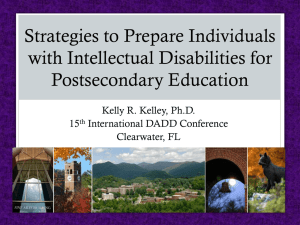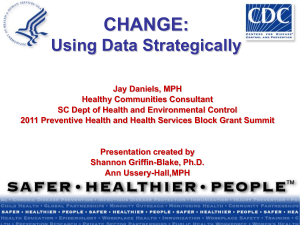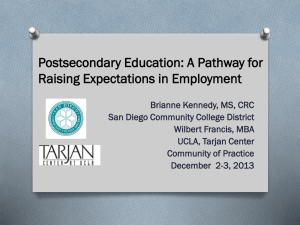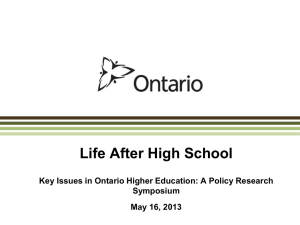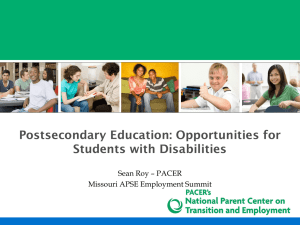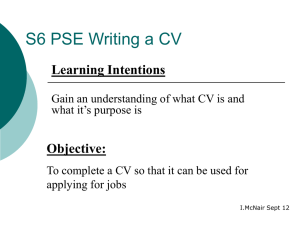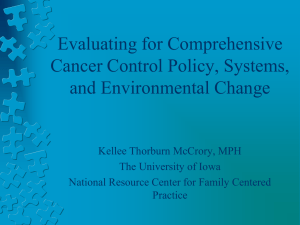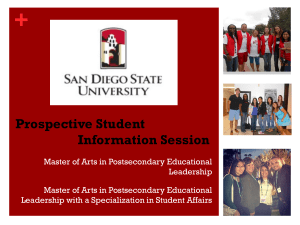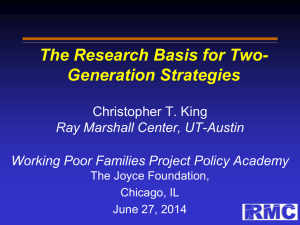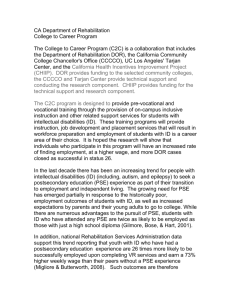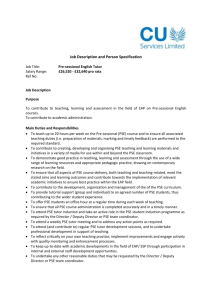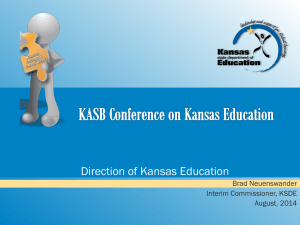PSE - Getting Started and Moving Forward
advertisement
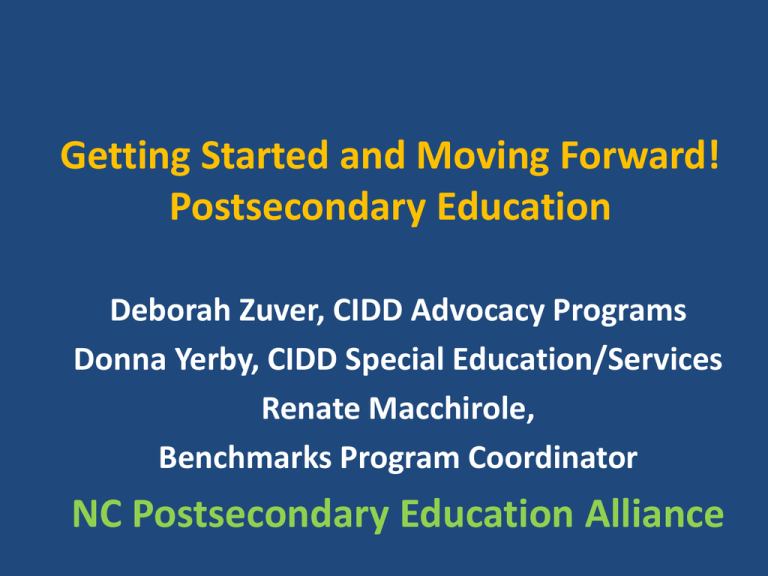
Getting Started and Moving Forward! Postsecondary Education Deborah Zuver, CIDD Advocacy Programs Donna Yerby, CIDD Special Education/Services Renate Macchirole, Benchmarks Program Coordinator NC Postsecondary Education Alliance NC Postsecondary Education Alliance EDUCATORS, AGENCY REPS, LEGISLATORS, YOUTH LEADERS & FAMILIES WORKING TOGETHER Increasing options & opportunities for students with intellectual disabilities Continuing education Employment Independent living Quality of life Policy changes www.cidd.unc.edu/psea Objectives → Become familiar with inclusive PSE opportunities on college campus → Identify PSE experiences that lead to meaningful employment → Learn about strategies and supports for developing and sustaining PSE programs Postsecondary Education: Education after high school; “college experience” has not been available to these students until recent years –Services under IDEA through age 21 –Accommodations/alternative assessments –Alternative diploma track Higher Education Opportunity Act: New Provisions • Financial Aid –Pell Grants –Federal Work-study program • Model Demonstration Programs (27) • National Coordinating Center • Certified Transition Programs (14+) Overview of PSE - Nationally • Less than 25% of students with I/DD have participated in any form of PSE • 6,000 students currently enrolled • Approx. 215 programs in 42 states Why is college important for students with ID? Postsecondary Education Inclusive opportunities and outcomes Human Rights Employment Independent living Quality of life How PSE Experience Can Affect Employment Possibilities PSE for students with IDD 3% Employment 12% 32% Independent Living College course access 16% Life skills instruction Self-determination 18% 19% Social skills Hart, Grigal, Weir (in press). A national survey of Findings of a national survey of postsecondary education programs for students with intellectual disabilities. Journal of Policy and Practice in Intellectual Disabilities. Work-based Learning: Inclusive Opportunities • Interest inventories and assessments • Community partnerships for employment • Course selection related to employment goals • On-campus jobs; work-study opportunities • Specialized curriculum leading to certificate • Internships and job-based instruction • Transition: job coach Paid Employment Youth who participated in PSE were 26% more likely to leave Vocational Rehabilitation with paid employment Earned a 73% higher weekly income Individuals need greater access to PSE supported by Vocational Rehabilitation Data Set: RSA 911 Migliore, A., Butterworth, J., & Hart, D. 2009. Postsecondary Education and Employment Outcomes for Youth with Intellectual Disabilities. Fast Facts Series, No. 1. Boston, MA: Institute for Community Inclusion Impact on Employment Youth with I/DD whose parents expected they would be employed were 28 times more likely to have enrolled in PSE after leaving high school than youth whose parents did not expect employment. (Papay, 2011) Predictors of Employment The only post-high school transition goal in IEPs that was a predictor of employment for students with ID was having the goal of attending a two or four year college. 11% of students with ID had this goal A Standards-Based Conceptual Framework Funding Sources used by students Private pay State VR funds Other funding sources Scholarships Local Education Agency Federal/State grant Tuition waived Social Security funds 46% 14% 13% 9% 7% 7% 5% 3% Moving Forward • Increase public • Support PSE options in all awareness NC geographic areas • Create system change • Demonstrate outcomes in that builds capacity terms of students, campus • Develop support community, families, state systems for students on service needs/budget, the autism spectrum increased diversity • Identify funding sources Getting started: Community Collaboration • • • • • • • Enlisting champions Business leaders Youth advocates College Admin & HR School system Commissioners Local news • • • • Local representatives Group home directors Support services Parents P.A.C.E. Pathways to an Accessible College Experience • The passion behind our mission • Taking your story to local advocates for support • Create the proposal and present to local stakeholders for buy in Student Recruitment • Day programs (Monarch Beach and Lighthouse Club) • Group homes • High schools • Knowing folks in your community in the who would benefit from PSE Challenges • Structural difference college setting and day group settings • Coordination between various programs, caregivers, and college schedule • Transportation • Must provide constant reassurance and communication open with caregivers Screening and Admitting • Students complete official PACE program application • Application is reviewed/approved by team at COA • Interview potential students and caregivers for selection process and limit pool of students to five students per new cohort Launching your Program • Invite community leaders\stakeholders to event • Utilize local radio stations with PSA’s • Newspapers\ online resources • Have students present at commissioner meetings • Seek support from local rotary clubs, advocacy groups Educate/Inform College Staff • Send out informative letter introducing the program to college staff and instructors • Include links to THINK college and NCPSEA websites for further education • Offer additional training and meetings for apprehensive instructors • Seek out local student government groups and get them involved Recruit Mentors • Partner with your college media division to assist in development\ distribute recruitment flyer • Email\ post flyer throughout the college • Set up information table at Open House or any club event for recruitment\ exposure Who are your Stakeholders? • • • • • • Group Homes/Day Programs Families – Cfac, First in Families Elementary/Middle Schools Social Services Civic Groups Hospitals • • • • • Chamber of Commerce Real Estate Organizations Business Leader Associations Government Agencies Financial Institutions Taking our Mission Straight to the Capital Educate/Inform - HOW • Meet with students to discuss how they feel about going to college and discuss goals. • Community project where students document their college experience through video journaling • Partner with local Arts Council\interested partners to showcase the journeys of the students • Present at local civic groups and governing agencies • In-service trainings for elementary, middle and high school teachers and counselors Educate/Inform- WHY? • • • • • • Empower students Preparing the next generation Changing mindsets Identifying/creating internship opportunities Job opportunities Have a voice in policy change – Lets go to Raleigh The Whole College Experience • Engage students in as many college activities as you can so they can participate with their peers • Participate and join clubs for exposure and inclusion with their peers • Mentors involved with Special Olympics Spring Games Internships • Encourage students to explore their interests • Be creative when finding the internship fit • Does the internship provide volunteer mentors, guidance to engage the student • Explore outside agencies to see about additional support • Provide guidelines and expectations of the student Dare County Health Department • “ I dream of being in the health care field” Jeanette’s Pier “I like the outdoors and to fish” Potential Students • Partner with local high schools to recruit prospective students • Arrange campus tours\ meetings with current students to ease the anxiety of potential students Most important lesson • “Don’t let perfect be the enemy of the good” Online Resources • Think College www.thinkcollege.net • NC Postsecondary Education Alliance (PSEA) www.cidd.unc.edu/psea • Post-Secondary Education Research Center (PERC) www.transitiontocollege.net – Info on options and trends; funded by OSEP. • The National Secondary Transition Technical Assistance Center www.nsttac.org – Builds capacity for transition outcomes; directed by the Special Education Program at UNC-Charlotte in partnership with Special Education Programs at Western Michigan State and ASU. Funded by OSEP. Thank you! Questions? Contact: Deborah.Zuver@cidd.unc.edu Donna.Yerby@cidd.unc.edu Rmacchirole@benchmarksnc.org North Carolina Postsecondary Education Alliance Carolina Institute for Developmental Disabilities University of North Carolina at Chapel Hill www.cidd.unc.edu/psea
